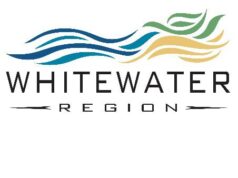ONTARIO (Minden) — John Yakabuski, Minister of Natural Resources and Forestry was joined by the Minister of Infrastructure, Laurie Scott in Minden, Ont. to announce Ontario’s first-ever, comprehensive flood strategy on Monday. Ontario’s Flooding Strategy outlines the province’s next steps to reduce flood risk and help Ontarians be better prepared for flooding events.
“We know that we can’t prevent flooding in Ontario – we can only become more resilient to it,” said John Yakabuski, Minister of Natural Resources and Forestry. “Our strategy is designed to increase public awareness and help us to be better prepared and equipped to respond to the devastating effects of flooding.”
“We’re listening to people from across the province who have been affected by flooding, and that is why we’re taking a whole-of-government approach and calling on the federal government, our municipal partners, conservation authorities, industry and Indigenous communities to work with us to implement the actions contained in this strategy.”
The strategy is a comprehensive government-wide approach to flooding and includes the following actions: increasing public access to current and timely information to better understand flood risks and how to prepare for flooding events; using improved future rainfall prediction data in long-term transportation infrastructure planning; reviewing the outcomes of Ontario’s Build-Back-Better pilot project under the Municipal Disaster Recovery Assistance program; establishing a multi-partner flood mapping technical team to participate in a review of current flood mapping technical guides; and working with the federal government to ensure Ontario’s continued access to national funding programs.
Since the spring of 2019, the Ontario government has taken significant steps to help protect people and property from flooding, including: obtaining new specialized software for emergency preparedness and response to better track, report and manage incidents and emergencies in the province; updating key provincial policies, such as the provision of sandbags to municipalities, First Nations and unorganized territories during a flooding emergency; engaging municipalities, watershed partners and other key stakeholders in Muskoka, Magnetawan and Upper Ottawa River areas on key water management and operational decisions; proceeding with a climate change impact assessment to better understand how climate change affects Ontario; launching a $1 million pilot project under the Municipal Disaster Recovery Assistance program to help eligible municipalities impacted by spring flooding (after March 31, 2019) rebuild damaged infrastructure; and expediting the approvals process for property owners to repair flood-related damage to shorelines.
In spring 2019, the Ministry of Natural Resources and Forestry provided approximately 890,000 sandbags to municipalities throughout southern and eastern Ontario and deployed over 60 Fire Ranger crews and additional support staff to many impacted municipalities.






![Kenopic/Smith Auction [Paid Ad]](https://whitewaternews.ca/wp-content/uploads/2018/10/advertising-100x75.jpeg)

